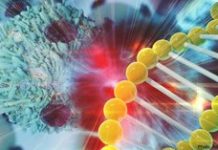The ECOG-ACRIN EA1131 study hypothesised that invasive disease-free survival (iDFS) would not be inferior but improved in patients with basal subtype triple-negative breast cancer (TNBC) treated with adjuvant platinum compared with capecitabine. The study results show that platinum agents do not improve outcomes in patients with TNBC residual diseases following neoadjuvant chemotherapy, regardless of intrinsic subtype, and are associated with more severe toxicity when compared with capecitabine. The study participants had a lower than expected 3-year iDFS regardless of study treatment, highlighting the need for better therapies in this high-risk population.
Prof. Ingrid A. Mayer of the Vanderbilt University in Nashville, TN, US and colleagues reported that the study findings should discourage the adjuvant use of platinum agents in patients with residual TNBC after neoadjuvant chemotherapy outside of a trial. The results are simultaneously reported at the 2021 ASCO Annual Meeting (4-6 June) and published in the Journal of Clinical Oncology.
Patients with evidence of residual invasive disease at surgery following neoadjuvant chemotherapy are more likely to have a recurrence and die from breast cancer, with reported 3-year event-free survival rates of 60%-70%. Adjuvant capecitabine for 6 to 8 cycles in patients with residual TNBC after neoadjuvant chemotherapy improved iDFS and overall survival (OS) in the CREATE-X study and became a standard of care.
Preclinical models support the use of platinum agents in the TNBC basal subtype. Several clinical studies have reported an increase in pCR with the addition of platinum to anthracycline- and taxane containing neoadjuvant chemotherapy in patients with TNBC, but toxicity is increased and the impact on long-term outcomes remains unclear.
The ECOG-ACRIN EA1131 study was originally designed to test the hypothesis that adjuvant platinum chemotherapy would improve iDFS compared with observation in patients with clinical stage II-III TNBC who had basal subtype residual disease in the breast after neoadjuvant chemotherapy. Once CREATE-X results became available, shortly after study activation, the EA1131 protocol was amended to replace observation with capecitabine as the control arm.
In the ECOG-ACRIN EA1131 study, patients with clinical stage II or III TNBC with ≥1 cm residual disease in the breast after neoadjuvant chemotherapy were randomly assigned to receive platinum (carboplatin or cisplatin) once every 3 weeks for four cycles or capecitabine 14 out of 21 days every 3 weeks for 6 cycles. TNBC subtype (basal versus non-basal) was determined by PAM50 in the residual disease. A non-inferiority design with superiority alternative was chosen, assuming a 4-year iDFS of 67% with capecitabine.
In total, 410 patients were randomly assigned to platinum or capecitabine between 2015 and 2021. After median follow-up of 20 months and 120 iDFS events (61% of full information) in the 308 (78%) patients with basal subtype TNBC, the 3-year iDFS for platinum was 42% (95% confidence interval [CI] 30 to 53) versus 49% (95% CI 39 to 59) for capecitabine.
Grade 3 and 4 toxicities were more common with platinum agents.
The Data and Safety Monitoring Committee recommended stopping the study at the 5th interim analysis in March 2021, as it was unlikely that further follow-up would show non-inferiority or superiority of platinum.
The authors concluded that these findings have an immediate impact in clinical practice, as they should discourage the adjuvant use of platinum agents in patients with residual TNBC after neoadjuvant chemotherapy outside of a clinical study.
They commented that only few other studies assessing the role of platinum in TNBC have survival as a primary objective, such as NRG BR-003, a phase III randomised study scheduled to complete accrual during 2021, that tests the addition of carboplatin to post-surgical anthracycline and taxane-containing chemotherapy in chemotherapy naïve patients with pathologic stage II or III TNBC. For now, the use of adjuvant platinum agents in unselected patients with TNBC remains investigational and capecitabine remains the standard therapy.
Furthermore, the ECOG-ACRIN EA1131 provides a richly annotated biobank to explore and develop further hypothesis for future clinical studies of new agents in this setting. Planned studies in the residual disease will evaluate genomic markers, gene expression, immune markers, circulating markers, including analyses of circulating tumour cells and cell-free DNA, and BRCA mutation status.
The study was funded by the US National Institutes of Health.







